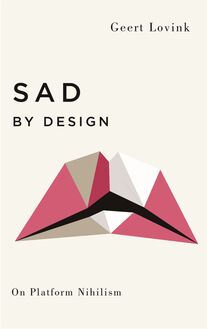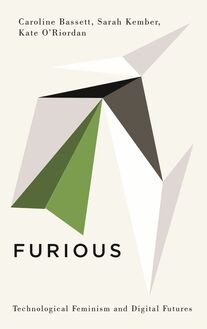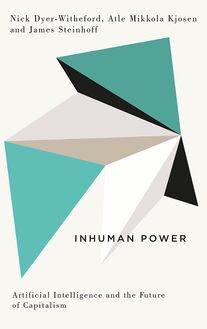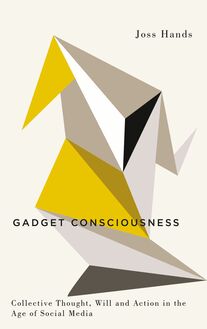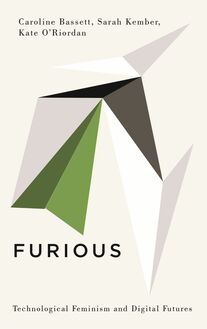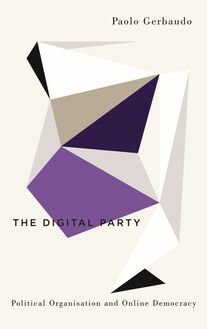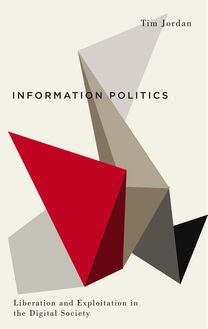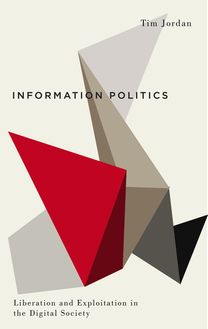-
 Univers
Univers
-
 Ebooks
Ebooks
-
 Livres audio
Livres audio
-
 Presse
Presse
-
 Podcasts
Podcasts
-
 BD
BD
-
 Documents
Documents
-
- Cours
- Révisions
- Ressources pédagogiques
- Sciences de l’éducation
- Manuels scolaires
- Langues
- Travaux de classe
- Annales de BEP
- Etudes supérieures
- Maternelle et primaire
- Fiches de lecture
- Orientation scolaire
- Méthodologie
- Corrigés de devoir
- Annales d’examens et concours
- Annales du bac
- Annales du brevet
- Rapports de stage
La lecture à portée de main
Vous pourrez modifier la taille du texte de cet ouvrage
Découvre YouScribe en t'inscrivant gratuitement
Je m'inscrisDécouvre YouScribe en t'inscrivant gratuitement
Je m'inscrisEn savoir plus
Vous pourrez modifier la taille du texte de cet ouvrage
En savoir plus

Description
In a compelling new work of feminist critical theory, Bassett, Kember and O'Riordan scrutinise many of the assumptions of a masculinist digital world, highlighting the tendency of digital humanities scholarship to venerate and essentialise technical forms, and to adopt gendered writing and citation practices. Contesting these writings, practices and politics, the authors foreground feminist traditions and contributions to the field, offering alternative modes of knowledge production, and a radically different, poetic writing style.
Through this prism, Furious brings into focus themes including the automation of home and domestic work, the Anthropocene, and intersectional feminist technofutures.
Series Preface
Acknowledgements
Preface
1. Feminist Futures: A Conditional Paeon for the Anything-Digital
2. Scale, Subject and Stories: Unreal Objects
3. Bland Ambition? Automation's Missing Visions
4. Driving at the Anthropocene, or, Let's Get Out of Here: How?
5. Technological Feminism and Digital Futures
Bibliography
Index
Sujets
Informations
| Publié par | Pluto Press |
| Date de parution | 20 novembre 2019 |
| Nombre de lectures | 0 |
| EAN13 | 9781786805669 |
| Langue | English |
Informations légales : prix de location à la page 0,1248€. Cette information est donnée uniquement à titre indicatif conformément à la législation en vigueur.
Extrait
Furious
A passionate guidebook to feminist theorising that refuses data as self-evident patterns and theory as beautiful abstractions, while insisting on the generative power of writing, fabulation, and future making.
Lucy Suchman, author of Feminist STS and the Sciences of the Artificial
This wide-ranging and imaginative book makes a compelling case for a feminist techno-politics which challenges to the core the masculinist grip of computational culture and science. It s also a book which pays fine attention to the process of writing.
Angela McRobbie, author of Be Creative: Making a Living in the New Culture Industries
Digital Barricades: Interventions in Digital Culture and Politics
Series editors:
Professor Jodi Dean, Hobart and William Smith Colleges Dr Joss Hands, Newcastle University Professor Tim Jordan, University of Sussex
Also available:
Shooting a Revolution:
Visual Media and Warfare in Syria Donatella Della Ratta
Inhuman Power:
Artificial Intelligence and the Future of Capitalism
Nick Dyer-Witheford, Atle Mikkola Kjosen and James Steinhoff
Cyber-Proletariat:
Global Labour in the Digital Vortex Nick Dyer-Witheford
The Digital Party:
Political Organisation and Online Democracy Paolo Gerbaudo
Gadget Consciousness:
Collective Thought, Will and Action in the Age of Social Media Joss Hands
Information Politics:
Liberation and Exploitation in the Digital Society Tim Jordan
Sad by Design:
On Platform Nihilism
Geert Lovink
Unreal Objects:
Digital Materialities, Technoscientific Projects and Political Realities Kate O Riordan
Furious
Technological Feminism and Digital Futures
Caroline Bassett, Sarah Kember, Kate O Riordan
First published 2020 by Pluto Press
345 Archway Road, London N6 5AA
www.plutobooks.com
Copyright Caroline Bassett, Sarah Kember, Kate O Riordan 2020
The right of Caroline Bassett, Sarah Kember and Kate O Riordan to be identified as the authors of this work has been asserted by them in accordance with the Copyright, Designs and Patents Act 1988.
Every effort has been made to trace copyright holders and to obtain their permission for the use of any copyright material in this book. The publisher apologises for any errors or omissions in this respect and would be grateful if notified of any corrections that should be incorporated in future reprints or editions.
British Library Cataloguing in Publication Data
A catalogue record for this book is available from the British Library
ISBN 978 0 7453 4049 4 Hardback
ISBN 978 0 7453 4050 0 Paperback
ISBN 978 1 7868 0565 2 PDF eBook
ISBN 978 1 7868 0567 6 Kindle eBook
ISBN 978 1 7868 0566 9 EPUB eBook
This book is printed on paper suitable for recycling and made from fully managed and sustained forest sources. Logging, pulping and manufacturing processes are expected to conform to the environmental standards of the country of origin.
Typeset by Stanford DTP Services, Northampton, England
Simultaneously printed in the United Kingdom and United States of America
For our mothers
Contents
Series Preface
Acknowledgements
Preface
1 Feminist Futures: A Conditional Paeon for the Anything-Digital
2 Scale, Subject and Stories: Unreal Objects
3 Bland Ambition? Automation s Missing Visions
4 Driving at the Anthropocene, or, Let s Get Out of Here: How?
5 Technological Feminism and Digital Futures
Bibliography
Index
Series Preface
Crisis and conflict open up opportunities for liberation. In the early twenty-first century, these moments are marked by struggles enacted over and across the boundaries of the virtual, the digital, the actual, and the real. Digital cultures and politics connect people even as they simultaneously place them under surveillance and allow their lives to be mined for advertising. This series aims to intervene in such cultural and political conjunctures. It features critical explorations of the new terrains and practices of resistance, producing critical and informed explorations of the possibilities for revolt and liberation.
Emerging research on digital cultures and politics investigates the effects of the widespread digitization of increasing numbers of cultural objects, the new channels of communication swirling around us and the changing means of producing, remixing and distributing digital objects. This research tends to oscillate between agendas of hope, that make remarkable claims for increased participation, and agendas of fear, that assume expanded repression and commodification. To avoid the opposites of hope and fear, the books in this series aggregate around the idea of the barricade. As sources of enclosure as well as defenses for liberated space, barricades are erected where struggles are fierce and the stakes are high. They are necessarily partisan divides, different politicizations and deployments of a common surface. In this sense, new media objects, their networked circuits and settings, as well as their material, informational, and biological carriers all act as digital barricades.
Jodi Dean, Joss Hands and Tim Jordan
Acknowledgements
We wrote this over a longer time than we intended. The benefit of this was that we had extended conversations with many more people - face-to-face, virtually, at our respective institutions and far beyond. We d especially like to acknowledge the Helsinki Collegium for Advanced Studies, and the Sussex Humanities Lab, both of which hosted writing sessions, and in the case of the Lab, public presentations. Susanna Paasonen read an early draft and cooked us dinner - thanks for both. Joan Haran was also an excellent reader. Thank you very much to our anonymous readers and reviewers whose feedback helped us understand the nature of the intervention we made. Specific thanks to Maggie Williams for telling us about the Brockengespenst phenomenon.
Preface
Furious: Technological Feminism and Digital Futures is an angry feminist intervention disputing the masculinization of computational culture and cultural theory. It draws on feminist genealogies, traditions of writing and approaches to science and technology in order to provide an alternative to heavily material and object oriented turns and to the masculinism, scientism and anti-feminism that dominate both cultural and knowledge production.
The book highlights the need to contest the regressively gendered and very often sexist politics of digital media forms, practices and study. It stresses the need to counter ideologies of scientism and anti-feminism and to reconnect feminist practices of thinking and writing with the contemporary problematic in order to re-conceptualize digital media and broader technological futures, pervasive mediation and increasing automation.
Technological transformations are accelerating in the world. There is a tendency in digital technology and innovation to celebrate the new, to rely on the technical fix and to promise futures in which good consumers are empowered. Discourses of big data dominate in political, economic and educational fields as well as in practices of media consumption. At the same time, the fields of digital media and digital humanities scholarship have a tendency to venerate technical forms and essences and to adopt gendered writing and citation practices. This is marked by, for example, the way that critical theory is considered separate from feminist thought, and the way that the material turn, object orientation and scientism is valourized. In this context, it is important to intervene, to offer a critique, and to contest those writing practices and politics. This book does so by foregrounding feminist traditions and contributions to media and cultural theory. Its aim is to offer alternative modes of knowledge production and to outline intersectional feminist values and visions of digital media and technological futures. Furious: Technological Feminism and Digital Futures frames the digital as a space of antagonism within which it is possible to rethink critical and political positions, including feminism. It does so in order to reformulate a sense of where we are, as differentiated subjects in techno-culture, and to rethink what needs to be done.
The book operationalizes its critique through structure and writing styles as well as scholarship. This preface provides a guide into the mode of address adopted in the introductory chapter, which is followed by three inquiries and a conclusion. The first chapter intervenes in the field through a mode of feminist poetics drawn from a history of collaborations and forms of address within feminist writing. The three inquiry chapters which follow do their work through an attention to: 1) bodies and selves; 2) work and home; and 3) environment and world. The final chapter develops a set of propositions about futures, knowledge and technology. The text draws attention to questions of authorship and citation, and stresses the validity of the modes of writing explored in the inquiry chapters.
Co-written by three leading scholars in the field of feminist media and science and technology studies, this book generates a playful, serious, writerly and furious tradition of feminist critique, in order to challenge the erasure of feminism and the (attendant) gendering of technological environments in the present, and in order to contest the technocratic utopias that are too often aligned with media theory and masculine metaphysics.
The book s introduction is interventional in form and content. It is a form of poetic writing that recalls a specific tradition of feminist writing and that signals, thereby, an incursion into the current problematic, understood as the digital, or post-digital. Here, the authors outline a concern with the naturalization of the digital: of big data, smart things and computable everything. They identify a collusion in this respect, between industry and academia, and argue that too often media theorizing and technological fantasizing come together in the purs
-
 Univers
Univers
-
 Ebooks
Ebooks
-
 Livres audio
Livres audio
-
 Presse
Presse
-
 Podcasts
Podcasts
-
 BD
BD
-
 Documents
Documents
-
Jeunesse
-
Littérature
-
Ressources professionnelles
-
Santé et bien-être
-
Savoirs
-
Education
-
Loisirs et hobbies
-
Art, musique et cinéma
-
Actualité et débat de société
-
Jeunesse
-
Littérature
-
Ressources professionnelles
-
Santé et bien-être
-
Savoirs
-
Education
-
Loisirs et hobbies
-
Art, musique et cinéma
-
Actualité et débat de société
-
Actualités
-
Lifestyle
-
Presse jeunesse
-
Presse professionnelle
-
Pratique
-
Presse sportive
-
Presse internationale
-
Culture & Médias
-
Action et Aventures
-
Science-fiction et Fantasy
-
Société
-
Jeunesse
-
Littérature
-
Ressources professionnelles
-
Santé et bien-être
-
Savoirs
-
Education
-
Loisirs et hobbies
-
Art, musique et cinéma
-
Actualité et débat de société
- Cours
- Révisions
- Ressources pédagogiques
- Sciences de l’éducation
- Manuels scolaires
- Langues
- Travaux de classe
- Annales de BEP
- Etudes supérieures
- Maternelle et primaire
- Fiches de lecture
- Orientation scolaire
- Méthodologie
- Corrigés de devoir
- Annales d’examens et concours
- Annales du bac
- Annales du brevet
- Rapports de stage


